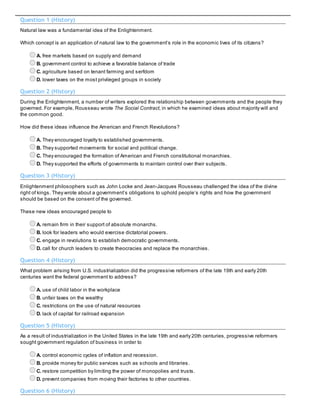
Enlightenment questions
- 1. Question 1 (History) Natural law was a fundamental idea of the Enlightenment. Which concept is an application of natural law to the government’s role in the economic lives of its citizens? A. free markets based on supply and demand B. government control to achieve a favorable balance of trade C. agriculture based on tenant farming and serfdom D. lower taxes on the most privileged groups in society Question 2 (History) During the Enlightenment, a number of writers explored the relationship between governments and the people they governed. For example, Rousseau wrote The Social Contract, in which he examined ideas about majority will and the common good. How did these ideas influence the American and French Revolutions? A. They encouraged loyalty to established governments. B. They supported movements for social and political change. C. They encouraged the formation of American and French constitutional monarchies. D. They supported the efforts of governments to maintain control over their subjects. Question 3 (History) Enlightenment philosophers such as John Locke and Jean-Jacques Rousseau challenged the idea of the divine right of kings. They wrote about a government’s obligations to uphold people’s rights and how the government should be based on the consent of the governed. These new ideas encouraged people to A. remain firm in their support of absolute monarchs. B. look for leaders who would exercise dictatorial powers. C. engage in revolutions to establish democratic governments. D. call for church leaders to create theocracies and replace the monarchies. Question 4 (History) What problem arising from U.S. industrialization did the progressive reformers of the late 19th and early 20th centuries want the federal government to address? A. use of child labor in the workplace B. unfair taxes on the wealthy C. restrictions on the use of natural resources D. lack of capital for railroad expansion Question 5 (History) As a result of industrialization in the United States in the late 19th and early 20th centuries, progressive reformers sought government regulation of business in order to A. control economic cycles of inflation and recession. B. provide money for public services such as schools and libraries. C. restore competition by limiting the power of monopolies and trusts. D. prevent companies from moving their factories to other countries. Question 6 (History)
- 2. What action by the leaders of the French Revolution demonstrates that they were influenced by Enlightenment ideas? A. They called for the fall of the absolute monarchy. B. They encouraged the conquests of Napoleon. C. They fought to maintain France’s colonial empire. D. They supported the combination of church and state. Question 7 (People in Societies) What was the effect of the passage of Jim Crow laws in the United States in the late 19th century? A. Racial segregation was required by law in southern states. B. Native Americans were moved onto reservations. C. Restrictions were placed on business monopolies. D. Women were denied the right to vote in national elections. Question 8 (People in Societies) What perspective of African-Americans was reflected in the founding of the National Association for the Advancement of Colored People (NAACP) in 1909? A. the desire for a return to their cultural heritage B. the need to improve working conditions in factories C. the desire to end legalized discrimination based on race D. the belief in the importance of building a new country in Africa Question 9 (Government) The 18th Amendment to the U.S. Constitution, ratified in 1919, prohibited the manufacture or sale of alcoholic beverages. In terms of the evolution of the Constitution, the ratification of the 18th Amendment represented A. a decrease in the powers of Congress. B. an extension of federal power into activities formerly regulated by states. C. a limitation on the powers of the federal government to regulate interstate trade. D. an increase in the power of the state courts to hear prohibition cases. Question 10 (Government) Use the following picture to answer question 35:
- 3. Source: Library of Congress Actions such as those shown in the picture above helped bring about A. the decision in Plessy v. Ferguson . B. the decision in Brown v. Board of Education. C. the 19th Amendment. D. the 26th Amendment.